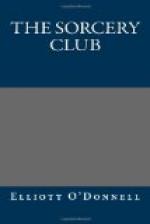“’Thomas Maitland, despite the remonstrances of his friends, visited Spain. By order of the Holy Inquisition he was arrested, May 5, 1693, on a charge of practising sorcery, and burned alive at the Auto da Fe, in the Grand Market Square, Madrid; having in the interim been subjected to such tortures as only the subtle brains of the hellish inquisitors could devise. On receipt of a message from him, delivered in his supernatural body, we attended his execution, and can readily testify that he suffered no pain, although the torments endured by those around him were pitiable to behold.
“(Signed) George
Richard Pool, Physician; and Robert
James Fox,
Merchant.
“Citizens of Boston, Massachusetts; August 1, 1693.’”
“Rot!” Hamar said savagely; “don’t waste time reading such bunkum.”
“It may be bunkum, but if it takes away his mind from his stomach let him go on,” Curtis interposed. “It’s very obvious you haven’t arrived at our pitch of starvation yet, Leon, or you would welcome anything that would make you forget it even for a moment. Let’s hear some more, Matt! Go on, tell us something. How to make coyottes out of paraffin paint, or convert a Sunday pair of pants into a glistening harem skirt! Anything that won’t remind us of food.”
Thus encouraged Kelson slowly turned over the pages of the book. “I see it was printed and published for—I presume that means by—A. Bettesworth and J. Batley in Pater-noster-Row, London, England, in 1690. Basle, London, Boston, Madrid! The author seems to have had wandering on the brain. By the bye, Leon, with your features you could easily work off a fake as ‘the Wandering Jew.’ There’s money in it—people will swallow anything in that line now.”
“I don’t see how it would profit you anyhow,” Hamar snarled. “Leave my features alone and go on with your reading.”
Kelson chuckled—here was one way at least in which he could occasionally get even with Hamar. Hamar’s features were Yiddish, and the Yids were none too popular in California.
“Oh, all right!” he said; “if the subject is so painful I’ll try and avoid it in future; but it’s odd how some things—for instance, murder and noses—will out. Let me see, what have we here? ’Discovery of ancient books, manuscripts, etc., relating to Atlantis.’ Apparently, Thomas Maitland, when shipwrecked on an island, called Inisturk, off Mayo, in Ireland, found a wooden chest of rare workmanship—he had seen, he says, similar ones in Egypt and Yucatan—containing some very ancient books—curiously bound, and some vellum manuscripts, which, after an infinite amount of labour, he managed to translate. The books, he says, were standard histories, biographies, and scientific works on occultism—all published in Banchicheisi, the capital of Atlantis—and the manuscripts, he affirms, had been transcribed by one Coulmenes, who believed himself to be the only survivor of a tremendous submarine earthquake that had destroyed the whole of Atlantis. The manuscripts included a diary of the events leading up to the catastrophe—even to the meals! How about this?—’Sunrise on the day of Thottirnanoge in the month of Finn-ra. Breakfasted on cornsop, fish (Semona, corresponding to salmon), fruit, and much sweet milk.’”




